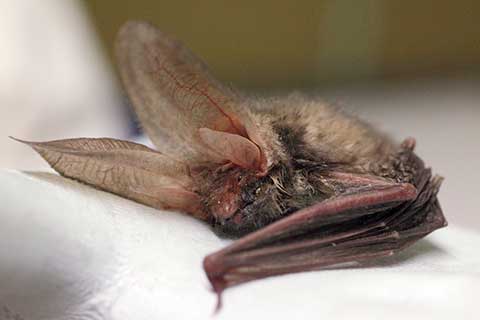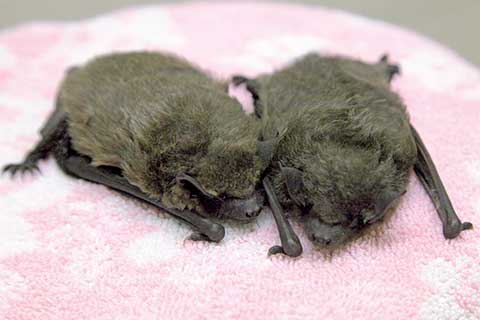Bats are protected by law
Bats and their roosts are protected by law in the UK - so you mustn't disturb or harm them in any way. Visit the Bat Conservation Trust's website for more information about laws protecting bats.
I've found a bat on the ground
Bats can't take off from the ground, so they’ll need help. They may be sick or injured too, so sometimes they will need to be checked by a vet or bat carer before they can be released. Bats need highly specialised care, so please don't try to look after a sick or injured bat yourself. Instead, contact the Bat Conservation Trust on their website or by calling their helpline on 0345 1300 228. They will tell you how you can help the bat, and how to handle and transport a bat safely.
You should avoid touching or handling bats unless it's absolutely essential, and always wear thick gloves if you do need to handle them. If you think you might have been bitten or scratched by a bat, follow the Bat Conservation Trust's advice as bats can carry diseases that can pass to humans.
Cat has caught a bat
If a bat has been caught by a cat, then it should always be treated as if it's injured. Being in a cat's mouth can cause injuries that we can’t see, so even if the bat seems fine, it will still need treatment by a vet or bat carer as a precaution.

A bat has flown into my house
If the bat is flying around your house and it’s night time, then keep the room calm and quiet to stop the bat from becoming stressed. Close the door to contain the bat in one room, then open all the windows as widely as you can. Move anything that might block the bat’s way out the window, such as the curtains. Finally, dim the lights and the bat should make its own way out of the room.
You should avoid touching or handling bats unless it's absolutely essential, and always wear thick gloves if you do need to handle them. If you think you might have been bitten or scratched by a bat, follow the Bat Conservation Trust's advice as bats can carry diseases that can pass to humans.
Remember to check that the bat has left and isn't hiding behind furniture or curtains.
If the bat isn’t flying, or it’s during the day, contact the Bat Conservation Trust on 0345 1300 228 for advice on what to do if a bat has entered your living area. Don’t try to catch a bat that’s flying, as this will put both you and the bat at risk.
Bat roost in your house
If you’re worried about a bat roost in your house, or you think you’ve accidentally disturbed a bat roost, please contact the Bat Conservation Trust for detailed advice.
If you often find bats in your house, especially baby bats, then they might be roosting in your roof. Bats and their roosts are legally protected and it's important to know whether a bat is an adult or juvenile. Please contact the Bat Conservation Trust if bats are in your living space.
I've found a baby bat
It's easy to mistake an adult bat for a baby, as people don't realise how small they can be! Baby bats, called pups, are found between June and August. They will be smaller than a 50p coin, have no fur and their eyes will be closed. Juvenile bats will be a bit bigger, have their eyes open and have short, velvety-grey fur.
Young bats need specialist care if they're orphaned, so contact the Bat Conservation Trust which can put you in touch with your local bat carer for more advice. Remember where you found the bat, as it may be possible to return it to its mother. Treat baby bats very carefully - if you’re told to pick them up, handle them with gloves or use a soft towel.





